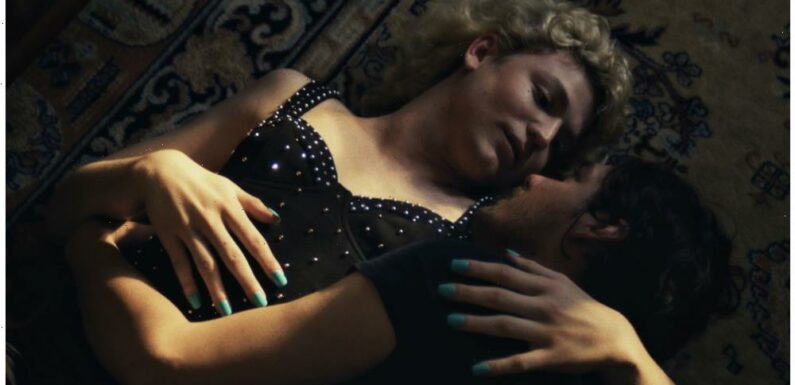
“Till the End of the Night” opens with what initially seems a Brechtian flourish: a nifty time-lapse shot of a bare shell of an apartment being painted, fitted, decorated and accessorized to an apparently lived-in state, as a vintage German torch song by Heidi Brühl crackles over the soundtrack. It’s not a film set being dressed, however, but a police one — the home base for an elaborate undercover investigation. It’s not the first time Christoph Hochhäusler’s romantic detective thriller will hint at subversive ambitions that turn out, upon closer investigation, to be rather conventional. Tossing a fraught transgender love story in the middle of an otherwise standard cop procedural, the film doesn’t much satisfy on either level, with superficial sexual politics and slack suspense. Despite a Berlinale competition slot, prospects beyond home turf appear limited.
What interest and ambiguity “Till the End of the Night” does have to offer is largely contained in the performance of transgender actor Thea Ehre. A steely but sensitive screen presence, she deserves a more intricately dimensional character than the rather erratic one screenwriter Florian Plumeyer has devised for her: Leni, a trans woman newly out of prison, having served half of a two-year sentence for dealing speed. Her parole is conditional on her assisting in a police mission to infiltrate an online drug-trafficking network run by her former employer; the apartment we see in the opening scene is the one she has to share with undercover narcotics cop Robert (Timocin Ziegler), with whom she has to pretend to be in a relationship for the sake of the investigation.
The kicker? Before her spell behind bars — in a men’s prison, which goes some way toward explaining her thick skin and weathering of abuse to come — Leni and Robert were lovers, only she was Lenard back then and hadn’t yet, in Robert’s typically crass wording, “tucked his penis away.” Quite why police brass decided that reuniting them would be a recipe for successful sleuthing is a mystery greater than most enfolded in the film’s slow, lurching plot. In any event, things are hostile between them from the get-go, with volatile transphobe Robert still resentful over her decision to transition, and subjecting her to both verbal taunting and physical assault. Though they play loved-up in the presence of others, Leni’s friends aren’t convinced: “That species thinks with its spinal cord,” warns one, not inaccurately.
Their target is Victor (Michael Sideris), a formerly famous DJ now turned club owner and drug kingpin. Leni and Robert join the salsa classes that Victor attends with his drifting partner Nicole (Ioana Iacob) — an environment that rather exposes, at least to the viewer’s eyes, the perilous lack of chemistry between this faux couple. Nonetheless, Victor gradually recognizes Leni and the two are soon friendly again; she in turn gets tight with Nicole, while persuading Victor to offer Robert a job as a driver.
And so the game is afoot, or would be if the film had anywhere really to go from here: Instead it stalls and circles, as the investigation is repeatedly hampered by Robert’s brutish, irresponsible conduct. (Rosa Enkat and Aenne Schwarz — so memorably potent in the 2018 rape drama “All Good” — are wasted in thankless roles as his rightly exasperated female superiors.) His bitter fights with Leni, meanwhile, repeat themselves until we get the implication — neither surprising nor terribly convincing — that there’s still passion there beneath it all. As Leni struggles with this punishing pull toward a man who, it seems, has never treated her well, Robert wrestles with his confusion over being sexually drawn to a woman for the first time.
It’s left to the thuggish Victor, somewhat implausibly, to spell out the film’s moral in this regard: “Just live it. It doesn’t have to have a name. All this shit is because people need to label things.” There’s an interesting drama to be built around this sentiment, and “Till the End of the Night” could be it if either of its principals were quite believable as individuals, let alone as a pair. Despite flickers of vulnerability and yearning in Ehre’s performance, Leni’s psychological backstory feels flimsy and plot-determined, while too much rests on Robert’s homosexuality in distinguishing him from the one-note boor he otherwise seems to be.
With his leather jacket and stringy, sweat-slicked hair, Ziegler is styled as a kind of throwback Fassbinderian anti-hero, and there’s something of the late New German Cinema titan, too, in the leads’ loud, corrosively sadomasochistic relationship across multiple queer lines. But despite the seamy, high-contrast grit of DP Reinhold Vorschneider’s lensing, the film never probes deeply or darkly enough into their conflicted attraction to fulfill this promise, and its more perverse lines of enquiry are leashed by the ongoingly straightforward, mostly predictable policier at its core.
Read More About:
Source: Read Full Article